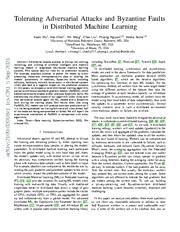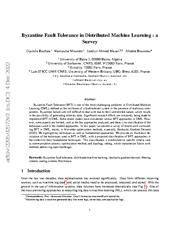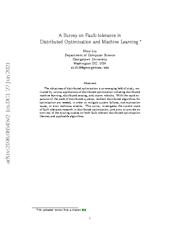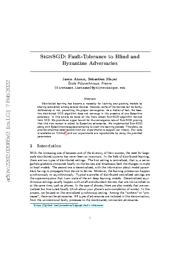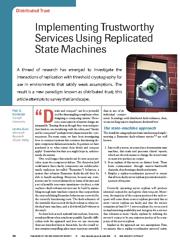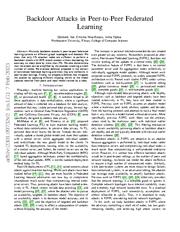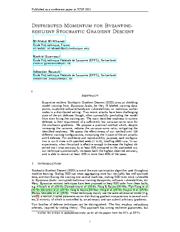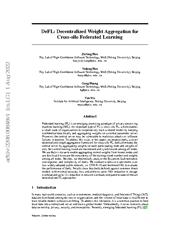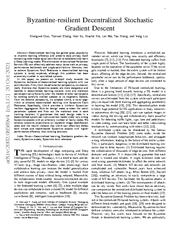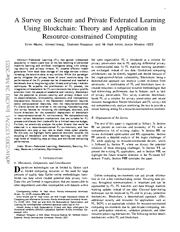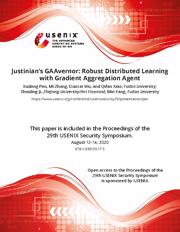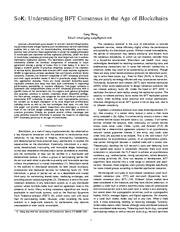A copy of this work was available on the public web and has been preserved in the Wayback Machine. The capture dates from 2021; you can also visit the original URL.
The file type is application/pdf.
Filters
Tolerating Adversarial Attacks and Byzantine Faults in Distributed Machine Learning
[article]
2021
arXiv
pre-print
Adversarial attacks attempt to disrupt the training, retraining and utilizing of artificial intelligence and machine learning models in large-scale distributed machine learning systems. ...
In this paper, we propose a novel distributed training algorithm, partial synchronous stochastic gradient descent (ParSGD), which defends adversarial attacks and/or tolerates Byzantine faults. ...
In previous studies on Byzantine fault tolerate (BFT), several consensus protocols and systems have been proposed to tolerate arbitrary faults in distributed system (e.g., PBFT [8] , Raft [27] , BFT-Smart ...
arXiv:2109.02018v1
fatcat:54ndlvp455ainklmvemlgwunaq
Tolerating Adversarial Attacks and Byzantine Faults in Distributed Machine Learning
[article]
2021
Adversarial attacks attempt to disrupt the training, retraining and utilizing of artificial intelligence and machine learning models in large-scale distributed machine learning systems. ...
In this paper, we propose a novel distributed training algorithm, partial synchronous stochastic gradient descent (ParSGD), which defends adversarial attacks and/or tolerates Byzantine faults. ...
In previous studies on Byzantine fault tolerate (BFT), several consensus protocols and systems have been proposed to tolerate arbitrary faults in distributed system (e.g., PBFT [8] , Raft [27] , BFT-Smart ...
doi:10.13016/m2nnqk-wqj5
fatcat:er4p4kdpafdn5ekxovgdbjydmu
Byzantine Fault Tolerance in Distributed Machine Learning : a Survey
[article]
2022
arXiv
pre-print
Byzantine Fault Tolerance (BFT) is one of the most challenging problems in Distributed Machine Learning (DML), defined as the resilience of a fault-tolerant system in the presence of malicious components ...
Byzantine failures are still difficult to deal with due to their unrestricted nature, which results in the possibility of generating arbitrary data. ...
The authors would also like to thank Professor Kamal Eddine Melkemi from the Department of Computer Science at Batna 2 University for useful discussion on machine learning and deep learning. ...
arXiv:2205.02572v2
fatcat:b7dwh5ajnjazpkwfsvsfoioe5u
A Survey on Fault-tolerance in Distributed Optimization and Machine Learning
[article]
2021
arXiv
pre-print
This survey investigates the current state of fault-tolerance research in distributed optimization, and aims to provide an overview of the existing studies on both fault-tolerant distributed optimization ...
The robustness of distributed optimization is an emerging field of study, motivated by various applications of distributed optimization including distributed machine learning, distributed sensing, and ...
We also discuss the special case of Byzantine fault-tolerant distributed machine learning. ...
arXiv:2106.08545v2
fatcat:g6fys4icrbbr5k3bd3ycylaptu
SignSGD: Fault-Tolerance to Blind and Byzantine Adversaries
[article]
2022
arXiv
pre-print
As a matter of fact, the baseline distributed SGD algorithm does not converge in the presence of one Byzantine adversary. ...
Our code is available on GitHub https://github.com/jasonakoun/signsgd-fault-tolerance and our experiments are reproducible by using the provided parameters. ...
In the case of blind adversaries, Figure 4 shows that distributed SGD can resist to the attacks. ...
arXiv:2202.02085v2
fatcat:ddiyflbcwnfjzm4oljrlv5u77y
Implementing Trustworthy Services Using Replicated State Machines
[chapter]
2005
Lecture Notes in Computer Science
The fault-tolerance of the ensemble thus exceeds the fault-tolerance of any individual state machine, and a distributed fault-tolerance is the result. ...
In analogy with distributed fault-tolerance, then, we are seeking ways to implement distributed trust. ...
The state-machine approach The details for using replicated state machines and implementing a Byzantine fault-tolerant service 1,2 are well known: 1. ...
doi:10.1007/978-3-642-11294-2_8
fatcat:pjsapx7n4fgv5ms7v2fhvg4yjq
Implementing Trustworthy Services Using Replicated State Machines
2005
IEEE Security and Privacy
The fault-tolerance of the ensemble thus exceeds the fault-tolerance of any individual state machine, and a distributed fault-tolerance is the result. ...
In analogy with distributed fault-tolerance, then, we are seeking ways to implement distributed trust. ...
The state-machine approach The details for using replicated state machines and implementing a Byzantine fault-tolerant service 1,2 are well known: 1. ...
doi:10.1109/msp.2005.125
fatcat:e3mnqp4aqrbrxloyxfhi4nz4ci
Backdoor Attacks in Peer-to-Peer Federated Learning
[article]
2023
arXiv
pre-print
We study backdoor attacks in peer-to-peer federated learning systems on different graph topologies and datasets. ...
We evaluate defenses proposed in the context of centralized federated learning and show they are ineffective in peer-to-peer settings. ...
We observed a similar pattern for fault tolerance as for graph types, as graphs with more fault tolerant capacity are more prone to attack, and the gap between them reduces with longer training. ...
arXiv:2301.09732v2
fatcat:7lx42iockje6fiahj3eqng2fcq
Distributed Momentum for Byzantine-resilient Stochastic Gradient Descent
2021
International Conference on Learning Representations
worker nodes in a distributed setting. ...
Byzantine-resilient Stochastic Gradient Descent (SGD) aims at shielding model training from Byzantine faults, be they ill-labeled training datapoints, exploited software/hardware vulnerabilities, or malicious ...
Cong Xie, Sanmi Koyejo, and Indranil Gupta. Zeno: Distributed stochastic gradient descent with suspicion-based fault-tolerance. ...
dblp:conf/iclr/MhamdiGR21
fatcat:nfzfnqimjbffjbwx5mcogpsqmi
DeFL: Decentralized Weight Aggregation for Cross-silo Federated Learning
[article]
2022
arXiv
pre-print
Besides, we theoretically analyze the Byzantine fault tolerance, convergence, and complexity of DeFL. We conduct extensive experiments over two widely-adopted public datasets, i.e. ...
Federated learning (FL) is an emerging promising paradigm of privacy-preserving machine learning (ML). ...
Difference from Byzantine Fault Tolerant Federated Learning There are many efforts in defending Byzantine attacks in FL and they can be categorized into proactive and reactive defenses [36] . ...
arXiv:2208.00848v1
fatcat:s64duytwufbu5ffijh4zwo7fzy
Adversary-resilient Distributed and Decentralized Statistical Inference and Machine Learning
[article]
2020
arXiv
pre-print
While the last few decades have witnessed a huge body of work devoted to inference and learning in distributed and decentralized setups, much of this work assumes a non-adversarial setting in which individual ...
In this article, we provide an overview of some of the most recent developments in this area under the threat model of Byzantine attacks. ...
ACKNOWLEDGEMENTS The authors gratefully acknowledge the support of the NSF (CCF-1453073, CCF-1907658), the ARO (W911NF-17-1-0546), and the DARPA Lagrange Program (ONR/SPAWAR contract N660011824020). ...
arXiv:1908.08649v2
fatcat:de356dvwinfv5g5njo64qmzpvi
Byzantine-resilient Decentralized Stochastic Gradient Descent
[article]
2021
arXiv
pre-print
First, from the adversarial perspective, we theoretically illustrate that Byzantine attacks are more dangerous and feasible in decentralized learning systems: even one malicious participant can arbitrarily ...
However, how to achieve Byzantine Fault Tolerance in decentralized learning systems is rarely explored, although this problem has been extensively studied in centralized systems. ...
Yang and Bajwa [13] proposed RD-SVM to support distributed Support Vector Machine (SVM) against Byzantine attacks. ...
arXiv:2002.08569v4
fatcat:jqsjyln3tnhjleiq4aic6f3yta
A Survey on Secure and Private Federated Learning Using Blockchain: Theory and Application in Resource-constrained Computing
[article]
2023
arXiv
pre-print
Federated Learning (FL) has gained widespread popularity in recent years due to the fast booming of advanced machine learning and artificial intelligence along with emerging security and privacy threats ...
To this end, we highlight some potential solutions towards the coupling of blockchain and federated learning that can offer high levels of reliability, data privacy, and distributed computing performance ...
Blockchain consensus protocols include: Proof of Work (PoW), Proof of Stake (PoS), Raft, and practical Byzantine fault tolerance [50] . • Proof of Work (PoW) discourages harmful blocks from being added ...
arXiv:2303.13727v1
fatcat:nwrlxlmvfjcaldvfoamyxe4tfu
Justinian's GAAvernor: Robust Distributed Learning with Gradient Aggregation Agent
2020
USENIX Security Symposium
This work was supported in part by the National Natural Science Foundation of China (61972099, U1636204, U1836213, U1836210, U1736208, 61772466, U1936215, and U1836202), the National Key Research ...
We would also like to thank the anonymous reviewers for their constructive comments and input to improve our paper. ...
efforts on building more robust and reliable machine learning systems. ...
dblp:conf/uss/PanZWXJY20
fatcat:at7djul3mvectpmpiwilghmq3u
SoK: Understanding BFT Consensus in the Age of Blockchains
[article]
2021
IACR Cryptology ePrint Archive
Byzantine fault-tolerant (BFT) state machine replication (SMR) is regarded as an ideal candidate that can tolerate arbitrary faulty behaviors. ...
Due to trust issues, it is hard to design a resilient system in practical situations because of the existence of various faults. ...
Besides, RSCoin relies on a two-phase commit protocol executed within each shard which, unfortunately, is not Byzantine fault-tolerant and can result in double-spending attacks by a colluding adversary ...
dblp:journals/iacr/Wang21c
fatcat:wggbkbi25fg43fieebp4qzlk3m
« Previous
Showing results 1 — 15 out of 1,307 results

